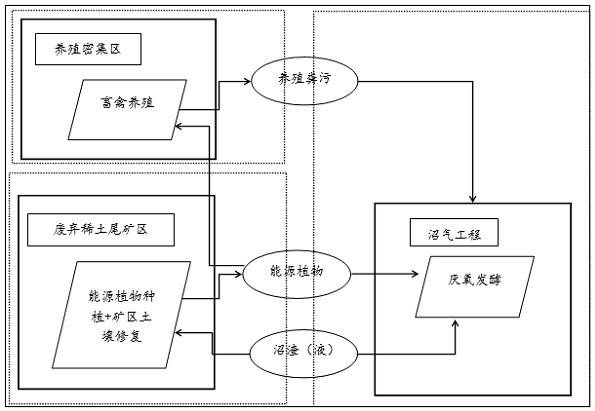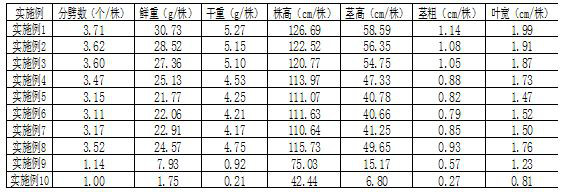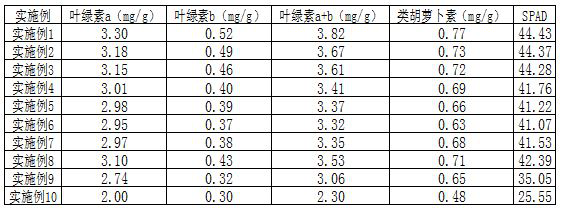A method for the treatment of ionic rare earth tailings based on biogas engineering
A technology of ionic rare earth and tailings, applied in the fields of seed and rhizome treatment, restoration of polluted soil, land preparation method, etc., to achieve huge economic benefits, solve emission problems, and improve vegetation survival rate
- Summary
- Abstract
- Description
- Claims
- Application Information
AI Technical Summary
Problems solved by technology
Method used
Image
Examples
Embodiment 1
[0026] A method for treating ionic rare earth tailings based on biogas engineering is realized through a series of effective measures such as pretreatment of ionic rare earth tailings, planting of energy crops, soil ecological restoration, and reuse of energy crops. The details are as follows:
[0027] 1. Pretreatment of ionic rare earth tailings: select the pretreated base 1 as the experimental base of this embodiment to carry out the restoration experiment;
[0028] 2. Planting of energy crops and soil remediation: screening of energy plants with strong adaptability to rare earth tailings, the selected varieties include: hybrid Pennisetum, miscanthus, mulberry, pokeweed, and imperial bamboo grass. After screening, the root system of imperial bamboo grass Developed, strong resistance to barren environment, and its vegetation can be used for animal husbandry, and it is more suitable for the present invention as an energy plant. The details are as follows:
[0029] . Seed...
Embodiment 2
[0041] A method for treating ionic rare earth tailings based on biogas engineering is realized through a series of effective measures such as pretreatment of ionic rare earth tailings, planting of energy crops, soil ecological restoration, and reuse of energy crops. The details are as follows:
[0042] 1. Pretreatment of ionic rare earth tailings: choose the pretreated base 2 as the experimental base of this embodiment to carry out the restoration experiment;
[0043] 2. Planting of energy crops and soil remediation: screening of energy plants with strong adaptability to rare earth tailings, the selected varieties include: hybrid Pennisetum, miscanthus, mulberry, pokeweed, and imperial bamboo grass. After screening, the root system of imperial bamboo grass Developed, strong resistance to barren environment, and its vegetation can be used for animal husbandry, and it is more suitable for the present invention as an energy plant. The details are as follows:
[0044] . Seed...
Embodiment 3
[0056] A method for treating ionic rare earth tailings based on biogas engineering is realized through a series of effective measures such as pretreatment of ionic rare earth tailings, planting of energy crops, soil ecological restoration, and reuse of energy crops. The details are as follows:
[0057] 1. Pretreatment of ionic rare earth tailings: select the pretreated base 3 as the experimental base of this embodiment for repair experiments;
[0058] 2. Planting of energy crops and soil remediation: screening of energy plants with strong adaptability to rare earth tailings, the selected varieties include: hybrid Pennisetum, miscanthus, mulberry, pokeweed, and imperial bamboo grass. After screening, the root system of imperial bamboo grass Developed, strong resistance to barren environment, and its vegetation can be used for animal husbandry, and it is more suitable for the present invention as an energy plant. The details are as follows:
[0059] . Seed pretreatment: Th...
PUM
 Login to View More
Login to View More Abstract
Description
Claims
Application Information
 Login to View More
Login to View More - R&D
- Intellectual Property
- Life Sciences
- Materials
- Tech Scout
- Unparalleled Data Quality
- Higher Quality Content
- 60% Fewer Hallucinations
Browse by: Latest US Patents, China's latest patents, Technical Efficacy Thesaurus, Application Domain, Technology Topic, Popular Technical Reports.
© 2025 PatSnap. All rights reserved.Legal|Privacy policy|Modern Slavery Act Transparency Statement|Sitemap|About US| Contact US: help@patsnap.com



